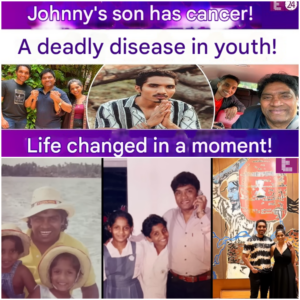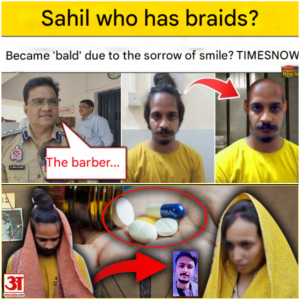Salman Khan wants to com m!t suic.id3? Truth of his serious illness revealed, uproar in Bollywood industry
.
.
.
play video:
Salman Khan’s Silent Battle: The Truth Behind the Suicide Rumors and His Painful Illness
Mumbai, India — Salman Khan, the celebrated Bollywood superstar known for his fearless on-screen persona and larger-than-life presence, has always stood tall in the face of controversy and adversity. Nicknamed the “Dabangg” of Indian cinema, his life has been a whirlwind of fame, philanthropy, and fandom. But behind the tough exterior lies a deeply personal struggle—one that has recently resurfaced in headlines, causing concern across the nation.
Shocking rumors about Salman Khan contemplating suicide have flooded social media over the past few days. These claims, though not confirmed by the actor himself, stem from a resurfaced conversation about his battle with Trigeminal Neuralgia, a rare and excruciating neurological disorder that Salman has publicly acknowledged in the past.
The news has sent shockwaves through the entertainment industry and among fans, prompting many to ask: What is the real story behind Salman Khan’s health? Could this condition truly push someone to such emotional depths?
The Emergence of the “Suicide Disease” Rumors
The recent rumors started gaining traction when a video report mentioned that Salman Khan was struggling with thoughts of ending his life due to the unbearable pain caused by his health condition. While no official statement from Salman or his family confirmed these claims, the reports linked his emotional suffering to his long-standing struggle with Trigeminal Neuralgia—a disorder often nicknamed the “Suicide Disease” due to the severity of pain it causes.
The gravity of the term shocked many, leading fans and mental health advocates to investigate further and urge for sensitivity in handling the issue.
What Is Trigeminal Neuralgia?
Trigeminal Neuralgia (TN) is a chronic neurological disorder that affects the trigeminal nerve, one of the most wide-reaching nerves in the head. It is responsible for sensations in the face, including the jaw, cheeks, and around the eyes. In patients with TN, even mild stimulation—such as brushing teeth, chewing food, or a light breeze—can cause sudden, severe, electric shock-like pain.
The pain is so intense and frequent that it can severely affect a person’s quality of life. TN is often called the “suicide disease” because many patients report feelings of hopelessness and a desire to escape the unending suffering.
Salman Khan’s Own Words: “The Pain Is Unimaginable”
Back in 2011, just before the release of his blockbuster Bodyguard, Salman Khan publicly revealed that he was undergoing treatment for Trigeminal Neuralgia. He even flew to the United States for a surgical procedure in hopes of finding relief.
“There was a time when the pain was so severe that I couldn’t talk, couldn’t eat, or even smile,” Salman said in an interview years ago. “It felt like someone was hammering my face repeatedly.”
He added that he had been silently enduring the condition for several years before it became unbearable. His admission at the time made headlines, not just because of his stardom, but because it opened a rare and important conversation about invisible illnesses and chronic pain.
The 2024 Update: Why the Concern Is Back
The renewed focus on Salman’s health came in the wake of another patient’s case—an 85-year-old man named B. Veeraswami, who recently underwent surgery for Trigeminal Neuralgia at a Chennai hospital. The case drew national attention because of its severity: Veeraswami was unable to brush his teeth, speak properly, or eat due to the intense pain. This story brought back public awareness of the condition—and reminded everyone that Salman Khan lives with the same disorder.
Social media quickly connected the dots, reigniting public concern over Salman’s well-being.
Mental and Emotional Impact of Trigeminal Neuralgia
The physical pain of Trigeminal Neuralgia is just one side of the story. What truly makes it devastating is the emotional and psychological toll it takes on patients.
Many sufferers report symptoms of depression, anxiety, and suicidal ideation, especially when the pain becomes resistant to medication. The condition is not only underdiagnosed but also often misunderstood by the general public.
Trigeminal Neuralgia is not terminal—but its ability to cripple a person’s daily functioning can make life feel unbearable. While Salman Khan is known for his strength and resilience, the emotional burden of this disease may still weigh heavily, particularly in moments of physical weakness or public pressure.
Salman Khan: A Fighter Through and Through
Despite these challenges, Salman Khan has never publicly expressed thoughts of suicide. In fact, throughout his career, he has shown tremendous willpower and dedication to his work—even when in pain.
He continued to act, produce, and host shows like Bigg Boss, while also investing time in humanitarian work through his foundation Being Human, which supports education and healthcare for the underprivileged.
His discipline in managing his physical condition, sticking to a rigid fitness routine, and continuing to deliver powerful performances on-screen is nothing short of inspiring.
Public Support and Industry Reaction
As the rumors spread, fans and fellow celebrities rallied in support of Salman Khan. Hashtags like #StayStrongSalman and #WeLoveSalman began trending across platforms like Twitter and Instagram.
Veteran actor Anupam Kher tweeted:
“Salman is one of the strongest individuals I know. Health battles don’t define him—his kindness and strength do. Let’s not spread fear. Let’s spread support.”
Actress and long-time family friend Shilpa Shetty also posted a heartfelt note:
“Pain doesn’t make you weak. It shows you’re human. Sending love and light to Bhai. We’re all with you.”
The Importance of Compassionate Reporting
While it is essential to raise awareness about serious health conditions like Trigeminal Neuralgia, sensationalizing the subject—especially with phrases like ‘Salman wants to commit suicide’—can be dangerous and irresponsible.
Mental health experts have urged media outlets to handle such stories with care. “Even if true, discussing suicidal ideation requires sensitivity, context, and verified facts,” said Dr. Radhika Joshi, a Mumbai-based clinical psychologist.
“When celebrities are involved, the impact is even wider. Misreporting can influence young fans, distort public perception, and even stigmatize mental illness further.”
Salman’s Silence: A Personal Choice
As of now, Salman Khan has not issued any formal statement regarding the recent wave of rumors. His team has remained silent, possibly to avoid giving attention to unfounded claims.
Those who know him well say that he prefers to keep his pain private and deal with it behind the scenes. This has always been his approach—whether it’s his charity work, legal battles, or health issues.
What We Know and What We Can Learn
To date, there is no confirmed report that Salman Khan is contemplating suicide. What we do know is that he continues to live with a chronic and painful illness, one that millions around the world also suffer from.
We also know that mental health needs more attention and compassion, especially when linked to physical pain that isn’t visible to others.
Instead of sensational headlines, perhaps this moment can serve as an opportunity to:
Raise awareness about Trigeminal Neuralgia and other “invisible illnesses.”
Encourage open, stigma-free conversations about chronic pain and mental health.
Remind ourselves that even the strongest among us have battles we don’t see.
Conclusion: Strength Beyond Stardom
Salman Khan is more than just a Bollywood icon—he is a symbol of perseverance, passion, and generosity. While his illness is serious, it’s his ability to continue working, giving back, and staying grounded that defines him.
As fans, the best thing we can do is respect his privacy, believe in his strength, and offer compassion—not sensationalism.
And if there’s one message to take away from this moment, it’s this:
Even heroes hurt. But they heal, too.
News
Meerut incident, painful incident in Meerut, wife brutally murdered husband, Alha voice – Sanjo Baghel
Meerut incident, painful incident in Meerut, wife brutally murdered husband, Alha voice – Sanjo Baghel. . . . play video: Tragedy in Meerut: Woman Kills Husband, Cuts Body into 15 Pieces With Lover’s Help Meerut, Uttar Pradesh – In one…
Uttar Pradesh News: Husband brutally beats wife, incident recorded in CCTV camera
Uttar Pradesh News: Husband brutally beats wife, incident recorded in CCTV camera . . . play video: Brutal Assault in Ghaziabad: Husband Caught on CCTV Beating His Wife in Public Ghaziabad, Uttar Pradesh – A horrifying case of domestic violence…
The result of installing a camera in a grave! You will be shocked by what you are about to see!
The result of installing a camera in a coffin! You will be shocked by what you are about to see! . . . play video: The Consequence of Placing a Camera in the Grave: A Warning from the Unseen In…
Johny Lever’s young son has a fatal disease, Jessey Lever is suffering from cancer, his life changes in a moment!
Johny Lever’s young son has a fatal disease, Jessey Lever is suffering from cancer, his life changes in a moment! . . . play video: The Miraculous Recovery of Jessey Lever: A Son’s Battle with Cancer and His Father’s Journey…
This Woman’s Miracle In The Mosque Will Shock You
This Woman’s Miracle In The Mosque Will Shock You || Miracle of Allah . . . play video: The Miraculous Discovery and the Power of Prayer: A Woman’s Transformational Journey to Islam In an inspiring story of personal transformation, a…
Meerut Saurabh Case: Sahil and Muskan, who wanted to spend their lives together, got separated in jail?
Meerut Saurabh Case: Sahil and Muskan, who wanted to spend their lives together, got separated in jail? | Hindi News . . . play video: The Tragic Murder of Saurabh: Unraveling the Sinister Plot of Muskan and Sahil In a…
End of content
No more pages to load











